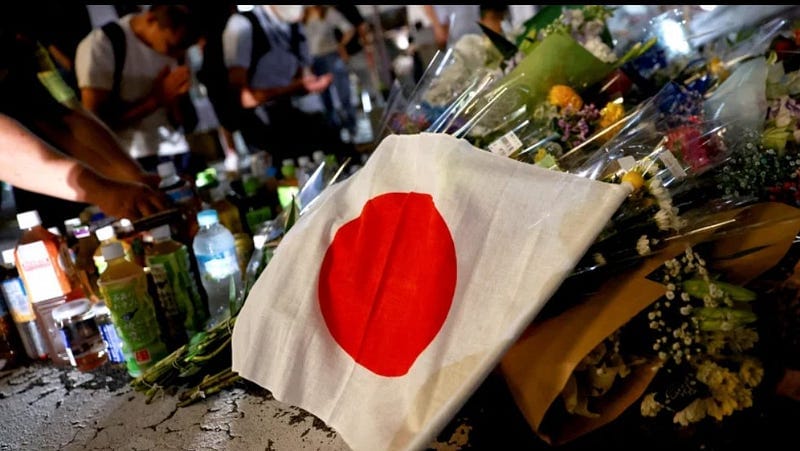Assassination in Japan Shocks the World
You will remember that day even if you try to forget

You will remember where you were when you heard what happened in the news that day. Within the last few months in the United States, murders by guns have rocked the nation. Yesterday, the nation of Japan was shocked by the news of a gun assassinating Shinzo Abe, the former prime minister.
July 8 will be noted forever as one of the saddest days in modern Japanese history. -DC Palter
The word assassination means “to murder (a usually prominent person) by sudden or secret attack often for political reasons.” I remember where I was when JFK was shot. As a high school student November 23, 1963, I was in the band room when the announcement came over the speaker, “The President has been shot.” I still feel the stunning sensation as a teenager. We were dismissed to go home early from school that day and stayed home several days after that. The nation was captivated by images on the black-and-white small TV screen in the living room.
The assassination of Shinzo Abe is shocking. The former Japanese prime minister, the longest-serving leader in the history of that office, was gunned down today with a homemade shotgun while giving a speech at a campaign rally in Nara for a parliamentary candidate. -Dan McLaughlin
Few may realize how unusual a crime this is, involving guns in Japan, within the last 70 years since World War II ended. In comparison to the US, Japan has .02% of murders by gun violence per 100,000. The US has 4.21 per 100,000.
Assassinations in the 1800s in Japan
A history of Japan dating back centuries is documented by Dan McLaughlin, for you to understand the context. During the 19th Century assassins were tools of others who wanted to seize power.
What that storyline misses, however, is a major campaign of assassinations by disgruntled, often impecunious, samurai, many of them ronin, who served no lord. The assassinations, frequently carried out by public ambushes, progressively robbed the shoguns of their most vigorous and able advisers and intimidated the rest.
The highlight of this reign of terror was the spectacular assassination of Ii Naosuke in March 1860. Ii was the chief minister and regent to the underaged shogun, and he conducted an energetic campaign to assert more centralizing power in the shogunate independent of the emperor, expand trade with the West, suppress the ronin and the rebellious daimyos, and generally modernize the nation under the shogun. In 1858, he concluded trade treaties with the United States, Holland, Russia, Britain, and France that the emperor opposed. Like Oda Nobunaga, he seemed to be accumulating new and destabilizing powers. An unprecedented letter of censure from the emperor was all the cover of legitimacy the assassins needed.
The 20th Century Assassinations
Progressing into the 20th Century after World War I, multiple assassinations occurred in Japan with a “renewed power struggle over the direction of the country.” Documents even mention attempts to murder movie star Charlie Chaplin who was visiting from US.
But particularly after the First World War, internal tensions driven by the military and militant nationalists set off a renewed power struggle over the direction of the country. Once again, assassinations became a major tactic of influencing policy. Japan ran through eleven prime ministers in the twelve years between 1921 and 1932. Three ended in assassination or assassination attempts: Hara Takashi in 1921, Hamaguchi Oschi in 1931, and Inukai Tsuyoshi in 1932. A fourth, Yamamoto Gonnohyoe, resigned in shame over security lapses in 1923 after a communist fired into the carriage of Hirohito, then the heir to the imperial throne. That attempt was partly in retaliation for the punishment of the 1910 plotters.
Hara was stabbed to death, and Hamaguchi shot and seriously wounded, both by nationalists enraged at restrictions on the Imperial Japanese Navy in the Washington Naval Treaty. Both attacks occurred at the same train station in Tokyo. Inukai was shot in his own home by a cabal of eleven naval cadets and officers after he restrained the navy in a confrontation with Chinese communists in Shanghai. The plot against Inukai included a plan to murder his guest at the time, Charlie Chaplin, who was attending a sumo-wrestling match with the prime minister’s son. Inukai’s last words to his killers were reportedly, “If I could speak, you would understand,” to which they responded, “Dialogue is useless.” Such is the language of assassination. His killing brought an effective end to civilian oversight of the Japanese military until after the war.
Preparing for the worst and hoping for the best
Nothing can prepare a nation for the assassination of leaders. Feelings of not being safe, of wondering what will happen next, tend to keep people in an ever-present state of anxiety.
“We learn from history that we learn nothing from history.” -Georg Hegel, German philosopher
The recovery is not easy.
The prevention is unclear.
A nation in mourning shows the world that it can happen to you anytime, anywhere. History repeats itself.

